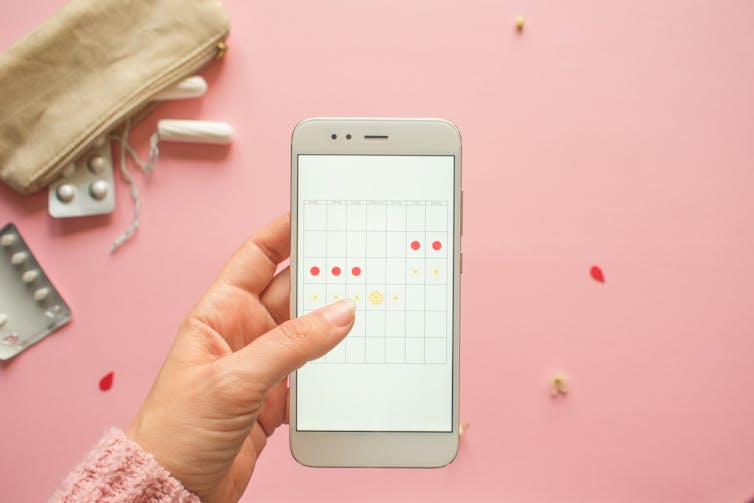After the overturning of Roe v Wade in the US, tracking reproductive information has never been riskier. In many US states, millions seeking and providing abortions could soon face criminal charges. Online conversations have turned to digital self-defence, and questions about the privacy of period tracking apps and other digital traces.
This concern is justified. Gender and racial justice researcher Cynthia Conti-Cook has documented the use of digital evidence to prosecute people accused of seeking abortions in the US. So far, this has been used in multiple cases against women of colour who already face significant barriers in reproductive healthcare.
Abortion tracking is likely to fit into other forms of criminalisation and surveillance marginalised communities face. This includes surveillance of low-income people seeking welfare, and the use of racially biased data-driven policing.
Law enforcement could gain access to intimate data by extracting it from phones during a criminal investigation. Some may even purchase data from “data brokers” which acquire and sell personal information without court oversight. And subpoenas may require companies that store data to share it. Some companies are already starting to respond to these fears – Google announced recently that it will delete location history data for users who visit abortion care providers.
We research digital privacy and security from a feminist perspective. If you are wondering how to protect yourself and your data, here are a few things to consider.
Period trackers
Millions of people use period tracking apps to better understand their menstrual cycle, or to help them avoid or get pregnant. There is fear that cycle histories could become evidence that someone has had an abortion. This is because apps can chart early signs of pregnancy or common side-effects of a miscarriage or abortion, if a user enters these.
There is good reason to be wary of these apps, but everyone should make decisions about whether to keep or delete their app on the basis of their own circumstances (for example, where you live and how much criminalisation risk you face). There are some useful things to know about these apps when you’re considering what to do.
Companies collect and store a lot of data. Many store cycle data, often in large, anonymised data sets, in order to generate new products, complete research, make inferences about their users, or sell to third parties.
Although most companies promise not to share this data with authorities, they might not be able to keep this promise. Digital service providers are obliged to follow the laws of the countries where they operate, and may have to comply with subpoenas from law enforcement.

Menstrual trackers are used by millions - but how much do those users know about how their data is stored? Trismegist san / Shutterstock
Without laws in the US enshrining the right to be forgotten, deleting apps that could hold “incriminating” reproductive information is not enough, as data remains stored on servers. Deleting data often requires email contact with those companies – although this is yet another digital paper trail, it can sometimes be the only way to make sure data is fully deleted. Be particularly wary of companies that don’t have information on this in their privacy policies.
Generally speaking, if you do use period trackers, make sure you’re using a privacy-first app such as drip, Read Your Body or Pow!. These do not collect any of your data on their servers, only store your cycle history on your phone and allow you to delete data easily. For these apps, simply uninstalling them does delete all your cycle data.
Defending yourself online
Digital privacy has long been a feminist issue. Privacy tools are already important for women experiencing technology-enabled intimate partner violence or online harassment. Now that we know data about our sexual and intimate lives is being collected and could be used for new purposes, we need these tools more than ever.
Resources developed by feminist and digital rights collectives, such as the DIY Guide to Feminist Cybersecurity and the Holistic Security Guide are useful tools that provide digital security guidance for protecting yourself on the internet. If you become familiar with privacy-first messengers such as Signal, or secure browsing options such as VPNs now, you won’t need to learn about them suddenly when you or someone close to you is in crisis.
People in the US who need abortions will now increasingly depend on networks of abortion funds which help people access and pay for abortion care. As both care seekers and providers are at high risk of surveillance and criminalisation, the role of digital security will be critical in protecting these organisations.
Security guidance from digital privacy advocates DCRYPTD and the Electronic Frontier Foundation provide advice specifically for reproductive care seekers and providers.
Organisations such as Chayn and Glitch have led the way in developing resources on online safety and digital self-care. Reconfigure, a project we collaborated on, ran community workshops on feminist digital privacy and security. These initiatives provide not only resources for personal self-defence, but also models for how we can all invest in community support as a way to keep each other safe.
A key consequence of the Roe v Wade ruling is that the constitutional right to privacy now seems under threat. The US needs better data protection laws, including a federal equivalent of the EU’s General Data Protection Regulation (GDPR) to make it harder to sell personal data, and easier for people to delete their own data. But no amount of digital privacy regulation or self-defence guidelines will remove the enormous risks and harms of reproductive healthcare being criminalised.
Post-Roe abortion restrictions are just one piece of a decades-long puzzle of anti-choice campaigning and attempts to control people’s bodies. This has been particularly acute for disabled people and people of colour, through forced sterilisation and people being criminalised for having miscarriages. Reproductive justice therefore involves not just digital defence, but the defence of the right to bodily autonomy for all.



 Federal Judge Blocks Trump Administration Move to End TPS for Haitian Immigrants
Federal Judge Blocks Trump Administration Move to End TPS for Haitian Immigrants  Federal Reserve Faces Subpoena Delay Amid Investigation Into Chair Jerome Powell
Federal Reserve Faces Subpoena Delay Amid Investigation Into Chair Jerome Powell  Trump Lawsuit Against JPMorgan Signals Rising Tensions Between Wall Street and the White House
Trump Lawsuit Against JPMorgan Signals Rising Tensions Between Wall Street and the White House  Panama Supreme Court Voids Hong Kong Firm’s Panama Canal Port Contracts Over Constitutional Violations
Panama Supreme Court Voids Hong Kong Firm’s Panama Canal Port Contracts Over Constitutional Violations  Federal Judge Rules Trump Administration Unlawfully Halted EV Charger Funding
Federal Judge Rules Trump Administration Unlawfully Halted EV Charger Funding  US Judge Rejects $2.36B Penalty Bid Against Google in Privacy Data Case
US Judge Rejects $2.36B Penalty Bid Against Google in Privacy Data Case  Meta Faces Lawsuit Over Alleged Approval of AI Chatbots Allowing Sexual Interactions With Minors
Meta Faces Lawsuit Over Alleged Approval of AI Chatbots Allowing Sexual Interactions With Minors  U.S. Lawmakers to Review Unredacted Jeffrey Epstein DOJ Files Starting Monday
U.S. Lawmakers to Review Unredacted Jeffrey Epstein DOJ Files Starting Monday  Citigroup Faces Lawsuit Over Alleged Sexual Harassment by Top Wealth Executive
Citigroup Faces Lawsuit Over Alleged Sexual Harassment by Top Wealth Executive  Panama Supreme Court Voids CK Hutchison Port Concessions, Raising Geopolitical and Trade Concerns
Panama Supreme Court Voids CK Hutchison Port Concessions, Raising Geopolitical and Trade Concerns  Federal Judge Signals Possible Dismissal of xAI Lawsuit Against OpenAI
Federal Judge Signals Possible Dismissal of xAI Lawsuit Against OpenAI  Trump Administration Sued Over Suspension of Critical Hudson River Tunnel Funding
Trump Administration Sued Over Suspension of Critical Hudson River Tunnel Funding  Norway Opens Corruption Probe Into Former PM and Nobel Committee Chair Thorbjoern Jagland Over Epstein Links
Norway Opens Corruption Probe Into Former PM and Nobel Committee Chair Thorbjoern Jagland Over Epstein Links  Newly Released DOJ Epstein Files Expose High-Profile Connections Across Politics and Business
Newly Released DOJ Epstein Files Expose High-Profile Connections Across Politics and Business  Minnesota Judge Rejects Bid to Halt Trump Immigration Enforcement in Minneapolis
Minnesota Judge Rejects Bid to Halt Trump Immigration Enforcement in Minneapolis 

































